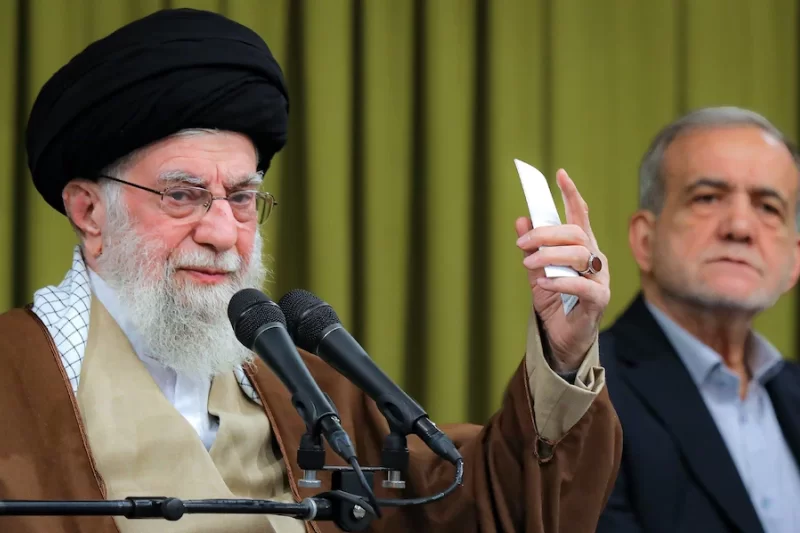Trump Can See off the Ayatollahs Without Firing a Shot
On January 23, 1963, at the height of the Cold War, President John F. Kennedy wrote to Jean Monnet: “America and a united Europe, working in full and effective partnership, can find solutions to those urgent problems that confront all mankind in this crucial time.”
Though those problems have changed markedly over the past six decades, Kennedy’s statement remains true today.
President Trump’s second term in office presents an opportunity for the US, UK, and EU member states to unite in confronting common threats, among the chief of them being the Islamist dictatorship that rules Iran.
In his first week in power, Trump has affirmed the global consensus that Iran cannot be allowed to obtain nuclear weapons. Now is the time for the West to act on that consensus.
The International Atomic Energy Agency’s Director General, Rafael Grossi, told reporters at the World Economic Forum in Davos on January 21st that Iran is “pressing the gas pedal”, with a sevenfold increase in its production of 60 per cent enriched uranium. The West is therefore faced with a closing window of opportunity to address Iran’s nuclear threat.
The world was first alerted to Tehran’s clandestine nuclear weapons programme by the People’s Mojahedin Organisation of Iran (PMOI/MEK) – the country’s main democratic opposition group, which has a vast network inside the country. Ever since, the US, UK, France and Germany have failed in their efforts to secure a verifiable agreement to close Tehran’s pathway to becoming a nuclear-armed state.
Tehran has fully exploited the West’s ill-conceived negotiating postures, attempts at conciliation, and outright appeasement. Far from being deterred, the regime’s malign nuclear ambitions have become ever more strident.
Moreover, Tehran has repeatedly cheated on agreements, deceiving the West, and thus enjoyed concessions even while inching closer to the bomb.
Despite this, negotiations continue because many in the West delude themselves that the only alternative is war. The real alternative is a robust policy of applying maximum pressure, with several specific components.
First, there should be meaningful oil and gas embargoes, to cut off funding to the regime.
Second, the UN sanctions that were suspended under the 2015 nuclear agreement should be reactivated through that same agreement’s “snapback” mechanism.
Third, the regime’s leaders should be held to account for their criminal conduct, including gross violations of human rights at home, belligerence in the surrounding region, and providing support to Russia in its war with Ukraine.
Fourth, the US and EU should provide moral and political support to the Iranian people’s democratic aspirations and the democratic coalition, the National Council of Resistance of Iran, with the MEK at its centre.
There is precedent for this, as many Western policymakers and experts already express support for the democratic opposition movement and recognise its viability as a force for change inside the Islamic Republic.
This was clearly illustrated by the outbreak of nationwide protests in late 2022. Though the regime survived narrowly, after killing 750 protesters and arresting another 30,000, anti-government sentiment has continued unabated in Iranian society, backed up by a concrete plan for regime change and a nationwide network of “Resistance Units” affiliated to the MEK.
Maryam Rajavi, the NCRI’s president-elect, has addressed the European Parliament and US Congress in recent months and highlighted the increasing activity of the Resistance Units and the “remarkable boost in the fighting spirit among young people” who support the coalition’s vision for a free, secular, democratic republic of Iran.
That is a vision that should be supported by Western governments, as it is already supported by many of their parliamentarians and officials. And it is a vision that is increasingly attainable, as Tehran’s domestic woes are compounded by its other losses.
In the last year alone, Iran has suffered devastating reverses within the region. The climax was the fall of Bashar al-Assad’s dictatorship in Syria, the linchpin of Tehran’s regional strategy for over four decades. His overthrow showed that even a large, heavily armed and well-funded autocracy cannot sustain a large-scale revolt by a population that wishes to be rid of it, least of all when that autocracy is internationally isolated, as the Iranian regime easily could and should be.
Such isolation would significantly empower forces inside Iran that have already overseen four nationwide uprisings in six years.
With the new Trump administration taking the lead, the West should adopt a unified, robust policy of maximum pressure. It should designate Iran’s repressive and belligerent paramilitary force, the Islamic Revolutionary Guard Corps, as a terrorist organisation.
It should side with the Iranian people and their democratic aspirations by formally recognising their right to fight back against a religious dictatorship and pursue a future society modelled on Maryam Rajavi’s ten-point plan, which includes free and fair elections, gender equality, minority rights, the rule of law and, crucially, an end to the regime’s nuclear programme.
Such an approach would put the Ayatollah on immediate notice that the West is united and that time is running out for his malign regime.
(Source: The Telegraph)













